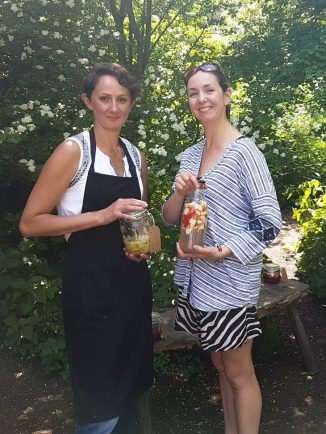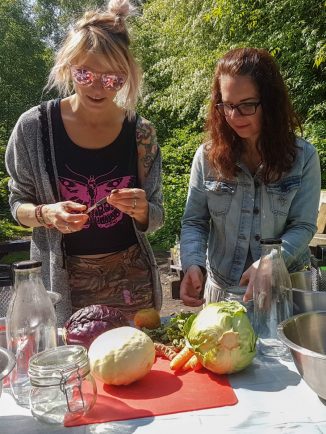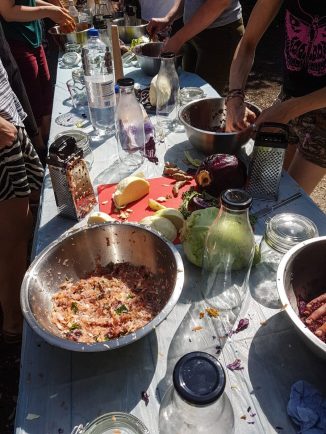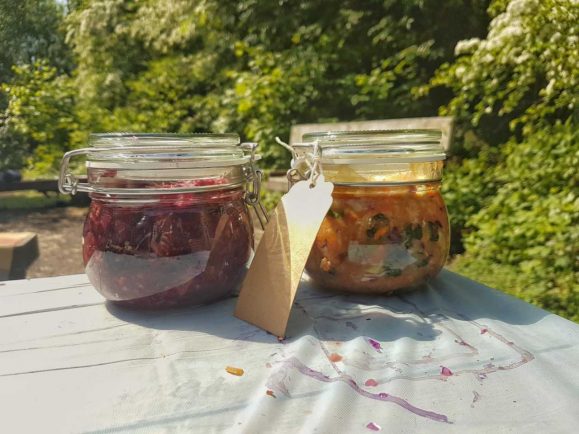THE ANCIENT process of fermentation has been part of food culture across the world for thousands of years.
And while the recent popularity of Korean staple kimchi and chinese kombucha tea may be considered a fad, the technique of ‘cooking’ and preserving food with bacteria occurs in everyday diets from cheese and yogurt, to beer and even chocolate.
I was introduced to the magic during a ‘Wild Fermentary Workshop’ – run by plant based chef Liz Bell and sour-dough baker Jess Mooney- which took place in the outdoor classroom in Leamington’s Foundry Wood.
After tasting a variety of zingy concoctions, from beetroot and ginger to fennel, dill and apple, and potions made from distilled water, fruits and sugar, I was soon ashamed of my unfounded allusions to soggy cabbage, and got to work on my first experiment.
Getting stuck in felt very child-like, using our hands to squish everything together and being surrounded by a collective buzz of excitement as we discovered the magic of creating something unique and yet so simple.
My own rainbow concoction included cabbage, apples turmeric and ginger. It looked like one of BFG’s dream jars.
We also made a drink from water, sugar, fruit and hawthorn petals – believed to aid anxiety and grief – foraged from the wood.
We were advised to give our elixirs at least four days, although fermented foods can be preserved for years before consumption.
Self confessed fermentation-addict Liz said: “I am passionate that everyone should be having a go at fermenting their own foods and drinks, it’s not difficult and with some simple instructions and a bit of confidence everyone can do it.
“My kids like olives, fermented carrot and cucumber sticks – I haven’t got them eating fermented cabbage yet, but I am working on them – and they love the fruit sodas.
“It is quite personal what people like and that is the great thing about it, you can make things just how you like them.
“It’s also a good way to save money, jars of live sauerkraut and kimchi can be very expensive.”
She added it was a great thing for kids to do since there was a lot of science behind the process.
Salt water or brine allows bacteria to grow on the vegetables which breaks natural sugars down into lactic acid, creating the pickled taste, which if left long enough turns to alcohol. It is the acid which halts the growth of bad bacteria.
Fermented foods produce healthy gut bacteria and help boost immunity. They can also curb cravings for sweets and heavily processed foods.
Jess said improved wellbeing was the biggest change she noticed along with a more conscious way of eating and making food.
And Liz added: “I run my own business and have three little children to look after, but through eating well and including fermented foods in my diet I have lots of energy, I am rarely ill and I keep at a healthy weight.”
She revealed she currently had 12 fermentation jars on the go – not unusual in her household.
And I am not far behind like a batty woman with jars for babies, lovingly ‘burping’ them twice a day and making any excuse to take a peep at their fizzing, life-affirming action.
Search ‘Wild Fermentary Workshops’ on Facebook or visit www.wildfermentaryworkshops.co.uk to book a place on the next workshop on Saturday (June 23) and to find out about future dates.
Visit foundrywood.co.uk to find out more about the wood which is maintained by volunteers.

















